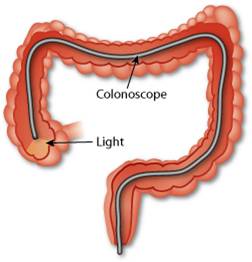What is a Colonoscopy?
Colonoscopy refers to the use of an endoscope to directly view and survey the lower gastrointestinal tract (the terminal ileum, colon and rectum). The colon is first cleansed using purgatives such as Polyethylene Glycol or an oral Fleet preparation, and the procedure is then performed as a day-surgery procedure by a trained endoscopist, who is a gastroenterologist or a surgeon.
Colonoscopies are an important tool in screening for Colorectal Cancer (CRC), and are the gold standard for the early detection of tumours and pre-cancerous polyps. A colonoscopy also has the advantage of allowing the sampling of tissue for histologic confirmation of the diagnosis (looking at the cells under a microscope), and also allows the removal of polyps, sparing the need for open surgery.

Who should have a Colonoscopy? A colonoscopy is performed for:
- Colon cancer screening
- Patients who have polyps
- Follow-up of previous polyps
- Evaluation of bowel symptoms
- Anaemia
- Blood in the stools
- Inflammatory bowel disease
- Ulcerative colitis/Crohn's disease
- Chronic Diarrhoea
How do I prepare for one?
The colon must be completely emptied of stool for the procedure. In general, this involves bowel cleansing, prior to the colonoscopy. You will be given instructions on the bowel preparation.
Bowel preparation can involve taking a liquid called PEG or laxatives, and followed by water to clean out the bowel.
If you are unable to complete the preparation, it may not be possible to perform the colonoscopy and the procedure will be postponed.
Most medications are safe to continue before the procedure. Please inform your doctor before the examination, especially if you are taking any blood thinners warfarin, aspirin or diabetes medication.
How is a Colonoscopy performed?
Light sedation will be administered to help you relax and better tolerate any discomfort. You might feel some pressure, bloating or cramping during the procedure, but this is usually well-tolerated.
The doctor will slowly advance a colonoscope though your colon to examine its lining. The procedure usually takes about 15 to 30 minutes to complete.

What happens after a Colonoscopy? You will be observed until the sedation has worn off, and will be discharged subsequently. Do not drive or operate any machinery till the next day, as the sedatives used will impair your reflexes.
You may experience mild cramping or bloating from the air introduced into the colon. This will improve quickly when you pass gas. You will be able to eat normally within the same day and resume your normal activities the next day.
What are the risks?
Colonoscopy is a very safe procedure. Complications are rare, but can occur. These include bleeding (<1%) and bowel perforation (0.2%). Bleeding can occur up to about two weeks after a colonoscopy. Rarely surgical treatment is needed. Some patients might have reactions to the sedation.
It is important to contact your doctor if you experience symptoms of severe abdominal pain, fever or rectal bleeding after colonoscopy.